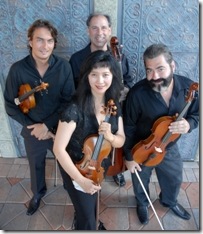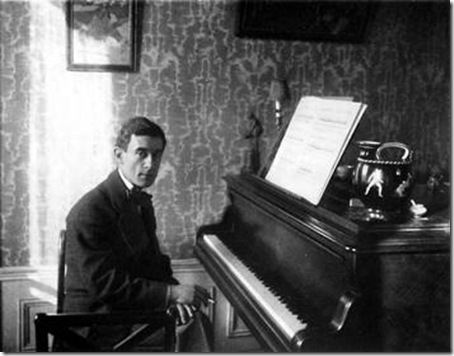In presenting a fine performance of one of the supreme masterworks of the 20th-century literature, the Delray String Quartet on Saturday night showed that it is an ensemble continues to grow and deepen, and that its current multi-venue concert series has been more than beneficial for it.
The quartet’s second program of the season, which opened at All Saints Episcopal Church in Fort Lauderdale, featured the great String Quartet in F of Maurice Ravel as its centerpiece, in a reading that was nuanced, sensitive and faithful to the extraordinary color and shade of the composer’s aesthetic. The group got all the major elements of the work right, and managed its formidable challenges with grace and style.
The Ravel occupied the second half of the concert, with the first devoted to an early work by Franz Schubert and one of the 17 string quartets of the Brazilian master Heitor Villa-Lobos. The Schubert Overture in C minor (D. 8a), originally written by the 14-year-old composer as a string quintet and then rearranged for quartet later that same year (1811), is a tensely argued, dramatic piece that reveals a writer of narrative strength and impressive melodic power.
Intonation, a sometime bugbear of the Delray, was solid throughout the Schubert, no doubt aided by the resonant reverb of the All Saints church. The main section of the Overture, after a somber introduction, begins with a terse four-note motto that sets the music on its way, but both in its initial appearance and the recapitulation, first violinist Mei-Mei Luo played it too matter-of-factly, and without the energy it needed to drive the music. It took a while for the momentum to build after that in both cases, amounting to a missed opportunity in an otherwise strong performance of this rewarding early Schubert essay. 
The Schubert was followed by the Quartet No. 5 (El Popular), which Villa-Lobos wrote in 1930. As Delray cellist Claudio Jaffé explained in interesting remarks before the concert, Villa-Lobos used 24 little piano pieces he’d written earlier as the source material for the quartet’s four movements. And the quartet proved to be little more than a bunch of attractive tunes strung together, one after the other.
But if the tunes are good, it doesn’t matter, and most of them were attractive enough. The first movement is probably the best of the four, opening with a delightful, sparkling melody that the Delray brought off with swagger and high spirits, relishing its forthright style. A minor-key contrasting tune in this same movement didn’t come off as well, partly because of what sounded like tuning difficulties, but may ultimately be that way because it doesn’t really work in the movement as a whole.
The Delray also gave good quarter to the many showy touches Villa-Lobos includes in the quartet, including the cascading scales and comic shimmies of the second movement, and the highly inflected, varied rhythms throughout, which are vital to the music’s profile. In the third movement, violist Richard Fleischman and cellist Jaffé played their simple chord-change motif (which had a real flavor of rock guitarisms, a couple decades before the fact) with precision and lightness, which lifted the music up, and all four players dug with enjoyable gusto into the Scotch-snap cowboy music of the movement’s second half.
The finale came off well, too, with Luo tackling the skittering rapid-fire figurations of the first bars with admirable accuracy, and the quartet as a group imbuing the music with exemplary vigor. Comparing the Delray’s reading of this quartet with another version after the concert, the Delray’s stood out as preferable: More colorful, sharper rhythmically, much livelier overall, which I think in turn is much more faithful to the music.
The Ravel Quartet that closed the formal program requires elegance and precision in equal amounts; it’s doubtful that any quartet of such rarified beauty is at the same time also so difficult. And the Delray’s performance was impressive and an audience-pleaser: the rapt silence between the third and fourth movements was a sure sign that the quartet had the attention of the 100 or so audience members at All Saints.
One could have wished for a slightly fuller statement of the opening melody, but the first movement of the Ravel was lovely otherwise, with the gorgeous second theme benefiting from the in-tune octaves of Luo and Fleischman and the tender way they played it. The pizzicato-flecked second movement set off at a good tempo and had plenty of punch, though the transition from the all-plucked opening to the sweeping second theme wasn’t quite exact, which took away some of the swing and drive of the movement.
The third movement was notable for its very carefully judged air of serenity and the way the four players (the second violinist is Laszlo Pap) luxuriated in the fat, rich chords of the first pages, then broke it off starting with a savage, bottom-of-the-register statement from Jaffé, a good example of how the quartet skillfully navigated the rapid mood shifts of this movement.
The five-beats-to-a-bar finale is an example of Ravel saving some of his trickiest writing for last, but clearly the Delray had prepared this well and took the time shifts that followed in stride. The opening measures could have done with a little more force; the elevated mood of the end of the third movement needs to be snapped off for the finale to start effectively.
Still, this was a laudable Ravel Quartet, and it’s encouraging to see the Delray take on the most important works of the string quartet canon and do them well. For an encore, the Delray also advanced, playing something light and yet substantial in the arrangement Dmitri Shostakovich made in 1931 of his Polka from the ballet The Age of Gold. This is young, witty Shostakovich at his best, and the quartet played this hilarious little piece with the same kind of polish and thought it gave the rest of its excellent program.
The Delray String Quartet will play the same program at 4 p.m. today at the Colony Hotel in downtown Delray Beach, and at 7:30 p.m. Friday at St. Thomas Episcopal Parish in Coral Gables. Tickets for the Delray appearance are $35, and $20 in Coral Gables. Call 213-4138 or visit www.delraystringquartet.com.
